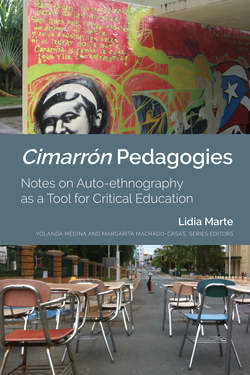Читать книгу Cimarrón Pedagogies - Lidia Marte - Страница 9
На сайте Литреса книга снята с продажи.
Оглавление←viii | ix→
Acknowledgments
I am grateful to my dearest friend and colleague, Natalia Biani, for being a compassionate witness, first reader and first editor of this book manuscript; without her enthusiasm for the contents, unconditional support, bilingual expertise and insights this work would have not existed. To the series editor at Peter Lang, Yolanda Medina, for her support and editing help since the book prospectus stages. I thank her for believing in the potential of this book and in my ability to complete it. I thank Peter Lang Publishers, for the risk and vision to publish this kind of work. I am grateful to my current and former students; without them this book would have not been necessary; I thank them for helping me remain a student and for inspiring me to continue teaching. I thank those who gave me permission to use samples of their work and evaluations. I thank all of those who did not drop my courses, being open minded and courageous to try the tools I offer, for letting me be a witness to their visions, struggles and cultural histories, and for nurturing hope, the certainty that new generations will help us create more sustainable, just and joyful worlds. Thank you to colleagues who read the manuscript and gave their endorsements.
Thanks to the Department of Sociology & Anthropology (DSA), University of Puerto Rico (Rio Piedras Campus), for support with accommodating schedules and course-load negotiations to have the time-space to focus on the completion ←ix | x→of my work. Gracias and bows of respect to our DSA chairs over these years, Jorge Giovannetti, Jaime Pérez (an ethnographer who teaches constantly through his kindness, humor and humbleness), and Lanny Thompson. To the chairs’ side-kick angels, administrative assistants, Mildred, Denise and Mari Carmen, for their kind help and for saving us from going mad with paperwork. Thanks to Dr. Ana Maritza Martinez, at one point, dean of the School of Social Sciences, for her time and kind support in moments of job crisis. Kind thanks to Bárbara Abadía-Rexach, innovative scholar, dedicated teacher and friend, for the collaboration to visit mutually our classes, learning from each other’s teaching styles. I am grateful to colleagues in the Comité de Personal of the DSA (especially to Jorge and Juan José), who—unbeknown to them—helped me return to Puerto Rico to complete my healing and to fine-tune my teaching. Thanks to Carlos Guilbe, a brilliant geographer with an ethnographer’s heart, for his support of my work, for his inspiring commitment to his teaching, for his friendship and refreshing sense of humor. Thanks to Viviana de Jesús, Paola Schiapacasse and other colleagues whose names are many to list, and to the “sin par” Donato, at the LabCAD. Thanks to Isar Godreau and Mariluz Franco, for their anti-racist and de-colonizing work that we have been using at UPR to further pedagogies of liberation, and for offering mentoring resources for undergraduate research. Thanks to the cleaning and maintenance crew and administrative staff from different schools and departments, for their work, and for their contribution to help create a community of solidarity in campus. I will be forever grateful to Carole Counihan, Samuel Wilson, Jonathan Shannon and Deborah Kapchan, for their mentoring and support all these years. Many years ago, Val Episcopo, at St. Edwards University (Austin, TX), asked me to explain my approach to using auto-ethnography in the classroom, to her also goes my gratitude, and here is my answer.
Gracias, to my family, who from their dispersed geographies, offer me their love and moral support, even when they don’t quite understand what is it that I do. Thanks to old and new dear friends, for their moral and survival support Dina, Lucia, Teresa, Eugenio and Lidia (la Camarada Reyes), Pamela, and to Elba Paoli (my middle school teacher and dear friend), among others. Thanks to Ana, for being the best neighbor and friend anyone could have, for feeding me and helping me to re-adapt to Puerto Rico, for teaching me to appreciate tropical place-making, for her kind humanity and her joyful disposition. I thank anyone else who directly or indirectly gave me help and moral support throughout the manuscript writing and completion process for this book.
I am grateful to the beautiful soundtrack that helped me to complete this book (especially during challenging days), in particular, in this ritual recurrence: Sona ←x | xi→Jobarteh & Band-Kora Music from West Africa (Gambia-London), Alí Farka Touré, The River (Mali), Irak Instrumental Music (Doha, Qatar), Coltrane (US, My Favorite Things), Bonga 1974 (Senegal), Cesarea Evora (Cape Verde), Ska-Reggae (mixed) and Nneka (Live in Berlin). The diversity of music and foods we have created makes life in this Planet delicious, and it reconciles me with my humanity.
←xi | xii→
